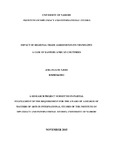| dc.description.abstract | The East African Countries have employed policy incentives in order to encourage foreign direct investment (FDI) inflows into their countries. Despite these measures, FDI inflows into the country have continued to be characterized by fluctuations. These fluctuations have been more marked from 1980's onwards. The objective of the study was to explore the impact of regional trade agreements on FDI inflows in Eastern African countries. The study also set out to measure the relative effects of these RTAs and to give policy recommendations based on the study findings. The study established that investment is a forward-looking activity that is based on the anticipation of future returns. In the EA Countries, foreign investments are positively related to political stability. Foreigners are less willing to risk in a politically unstable environment, because it eventually reduces the rate of return on investment. In addition, it lowers the economic value of the firm‟s assets after a period of conflict, regardless of whether the conflict was internal or external. This is because the host economy‟s exchange rate becomes more volatile in the face of political instability. Greater political stability among the EA countries serves to increase the amount of FDI in the integrating economies. Any member state in the EA Countries whose degree of political risk goes below the region‟s average stands to experience an outflow of FDI from their economy to other destinations within the RIA. Based on the findings this study recommended that RTAs with more trade and investment provisions attract more inward FDI; it is thus sensible to negotiate more investment and trade provisions if the aim is to attract additional FDI. EA countries should strive to maintain a high level of political stability. Some of the components that should be targeted to achieve this are government stability, which indicates a government‟s ability and effectiveness in carrying out its programmes, observance of the rule of law and order, enhancement of security within the country to minimize the risk of internal conflict, elimination of corruption and promotion of transparency and accountability both within and outside government, and finally improvement in the quality of a country‟s bureaucracy. | en_US |

